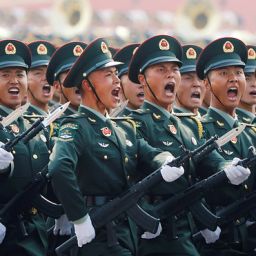Extract from Chapter 3 – Western Civilization Under Siege
Chinese use of soft power to extend its global influence
The Chinese Communist Party (CCP) also uses ‘soft power’ to advance its influence and interests in foreign countries. ‘Soft power’ is an all-embracing term, covering propaganda, infiltration of foreign political parties and institutions, influence peddling, control of foreign media, the mobilization of overseas Chinese, and threats against dissidents.
To mobilize the vast Chinese global diaspora, numbering over fifty million people, the CCP has developed a highly-sophisticated, multi-faceted plan, implemented by several well-resourced agencies targeting overseas Chinese. The history, goals, plans and tactics of this program have been revealed in detail by James Jiann Hua To, a New Zealand political scientist, of Chinese ethnicity, and a foremost authority of China’s efforts to shepherd its overseas Chineses, in his book, Qiaowu: Extra-Territorial Policies for the Overseas Chinese. James To describes in detail the CCP’s policies and practices towards ‘Overseas Chinese’. Overseas Chinese management is known as qiaowu, with the purpose of rallying support for Beijing amongst ethnic Chinese outside of China through various propaganda and thought-management techniques.[i]
James To’s book reveals that, in the longer term, qiaowu work involves mobilizing ethnic Chinese as voting blocs and placing Chinese candidates loyal to the PRC in parliaments and public positions.[ii] Much of the qiaowu work is conducted by the United Front Work Department (UFWD) of the CCP Central Committee.’ The UFWD targets Chinese social organizations, Chinese-language media, student associations, professional associations and business leaders. The Propaganda Department of the CCP is also central to the campaign.[iii] The UFWD has grown in importance under President Xi Jinping, who described United Front work as a ‘magic weapon’ in the great rejuvenation of the Chinese people.[iv]
Confucius Institutes
The Chinese government has established research centers and institutes in leading Western universities. From 2004 to 2014, it increased the number of foreign universities with Confucius Institutes (CIs) from one to 465 university campuses in 123 countries,[v] spending up to $US500,000 establishing each. Most university institutes funded by the CCP are marketed as organizations dedicated to cross-cultural research and understanding.
However, members of the Chinese political class indicate that their purpose is not objective research in the time-honored academic tradition, but pro-CCP propaganda. The Economist reported that Li Changchun, once the fifth-ranked member of the standing committee of the Politburo, described Confucius Institutes as “an important part of China’s overseas propaganda set-up”.[vi]
As early as 2008, concerns were raised about the Chinese government’s use of CIs to censor free speech on Western campuses. By 2014, discomfort with the use of Western universities as soft targets for CCP propaganda had become so intense that the American Association of University Professors issued a public condemnation of Confucius Institutes. It defined them as “an arm of the Chinese state… under the supervision of Hanban, a Chinese state agency which is chaired by a member of the Politburo and the vice-premier of the People’s Republic of China”.
Some Confucius Institute contracts include a clause that restricts criticism of the CCP, stipulating that CIs “shall not contravene concerning the laws and regulations of China”. By default, this refers to the laws and regulations of the ruling Communist Party. John Fitzgerald, president of the Australian Academy of the Humanities, revealed that the CCP presented a list of topics not to be mentioned in colleges, the media or the Internet. Taboo topics include “freedom of speech, judicial independence, civil society, civil rights, and universal values in addition to criticism of the CCP.” The ideals banned by the CCP are the sustaining values of liberal democracy. Despite positive developments pertaining to China’s liberalization and adoption of capitalism, much of the CCP ideology remains Maoist.[vii]
[i] James Jiann Hua To, Qiaowu:Extra-Territorial Policies for the Overseas Chinese, Brill 2014
[ii] Ibid, p. 42
[iii] Ibid, pp. 73-80
[iv] Marcel Angliviel de la Beaumell, The United Front Work Department: ‘Magic Weapon’ at Home and Abroad, The Jamestown Foundation, China Brief, 6 July 2017, Volume: 17 Issue: 9
[v] John Sudworth, “Confucius institute: the hard side of China’s soft power”, BBC News, December 22, 2014.
URL: www.bbc.com/news/world-asia-china-30567743
[vi] “A message from Confucius: new ways of projecting soft power”, The Economist (UK), October 22, 2009.
URL: www.economist.com/node/14678507
[vii] John Fitzgerald, quoted in Jennifer Oriel, “Managing Chinese soft power without killing trade is the key”, The Australian, September 12, 2016 [paywall-protected article].
URL: www.theaustralian.com.au/opinion/managing-chinese-soft-power-without-killing-trade-is-key/news-story/5968bdbfc83bb8a2011a7cdda293587e
